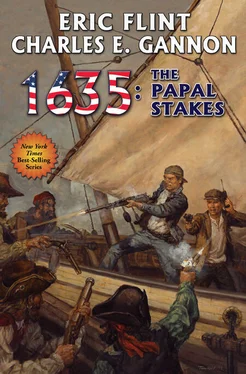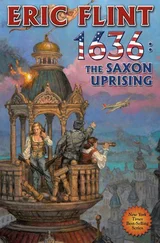Eric Flint - 1635 - The Papal Stakes
Здесь есть возможность читать онлайн «Eric Flint - 1635 - The Papal Stakes» весь текст электронной книги совершенно бесплатно (целиком полную версию без сокращений). В некоторых случаях можно слушать аудио, скачать через торрент в формате fb2 и присутствует краткое содержание. Жанр: Исторические приключения, на английском языке. Описание произведения, (предисловие) а так же отзывы посетителей доступны на портале библиотеки ЛибКат.
- Название:1635: The Papal Stakes
- Автор:
- Жанр:
- Год:неизвестен
- ISBN:нет данных
- Рейтинг книги:3 / 5. Голосов: 1
-
Избранное:Добавить в избранное
- Отзывы:
-
Ваша оценка:
- 60
- 1
- 2
- 3
- 4
- 5
1635: The Papal Stakes: краткое содержание, описание и аннотация
Предлагаем к чтению аннотацию, описание, краткое содержание или предисловие (зависит от того, что написал сам автор книги «1635: The Papal Stakes»). Если вы не нашли необходимую информацию о книге — напишите в комментариях, мы постараемся отыскать её.
1635: The Papal Stakes — читать онлайн бесплатно полную книгу (весь текст) целиком
Ниже представлен текст книги, разбитый по страницам. Система сохранения места последней прочитанной страницы, позволяет с удобством читать онлайн бесплатно книгу «1635: The Papal Stakes», без необходимости каждый раз заново искать на чём Вы остановились. Поставьте закладку, и сможете в любой момент перейти на страницу, на которой закончили чтение.
Интервал:
Закладка:
Which, Sharon realized, was how Maffeo Barberini-now Urban VIII-had been brought up to think in relation to his allies. “Pontiff” had been a late addition to his many titles; first scion and incumbent head of the powerful Barberini family had been roles he inherited upon his birth. He had been trained to think in terms of stratagems against hereditary enemies, and sinecures for loyal vassals-and his ascension to the cathedra of the Holy See did not diminish his adherence to that modus operandi. Urban VIII, never forgetting his family or friends, had left a legacy (well-recorded in the up-timers’ books) of shameless nepotism-for which he was infamous, even among the many early modern popes that had been known for it.
But now, Sharon wondered, did she see some signs of regret? His brother Francesco was among the cardinals who had been slain attempting to flee Rome. His nephew, Antonio, had made good his escape to Sharon’s refugee embassy by only the slimmest of margins himself, and would not have succeeded at all had not her husband Ruy chanced upon him while he was trying to find a way to escape the city’s walls.
Urban’s hands were folded passively on the front of his cassock. “I shall pray for your friends and father, Ambassadora. I owe them all a great debt. And, in the case of Thomas Simpson, I owe him my very life-along with you, Senor Casador y Ortiz. If it was not for your bold rescue of me from Sant’Angelo, the rubble of Hadrian’s tomb would surely be my burial mound, now.”
Urban extended one hand and placed it briefly upon Ruy’s head. Then he turned and left. When Ruy rose, his face was transformed-utterly open, utterly without pretense-rather like a man who remembers, for one brief instant, the innocent hope and faith he had as a young boy. Sharon felt the strangest rush of both tenderness and arousal, seeing him so stripped of his facade for that moment-and then Ruy as she knew him was back: he smoothed aside one wing of his mustaches and turned to her, his dark brown eyes glittering and alert. “We should send word to the exfiltration team in Switzerland,” he said.
“Word to-? Yes, of course!” Sharon turned to the waiting radio operator. “Odo, raise the exfiltration team. Let them know that contact has been lost with both the group they are to extract and Colonel North’s security detachment. They may have been monitoring and heard it themselves, but it’s also possible that the signal didn’t get through to Chur.”
“And is there any other message for Chur?”
“Yes. The extraction team there is to start for the rendezvous point now.”
“Ambassador, it will be night before they arrive. And if they reach the site early, and must loiter-”
“Odo. I understand the risks. To all three groups. But if Dad and the rest are on the run, they probably won’t be able to signal again. So we’ve got to consider the abrupt end of their transmission as a call for extraction.” She drew in her breath. “Send the message to Chur-and tell them to move as fast as they can.”
CHAPTER FOUR
“So, you see,” said Estuban Miro to the other two men, “the USE in general, and the State of Thuringia-Franconia in particular, is most interested in discussing mutual political and fiscal interests with the powers here in Chur.”
The more animated of the two men leaned forward eagerly, dark hair framing a pale, deceptively soft-featured face, out of which shone two very dark, but very bright, eyes. “And what- specifically what-would those interests be?”
Miro looked into those intense, unblinking eyes and thought: yes, this was the Georg Jenatsch he’d read about in the Grantville library, the man who killed a political rival with a savage axe-blow and then left the corpse pinned to the floorboards.
Well, Miro amended, it hadn’t been Jenatsch himself who’d swung the axe that killed the night-shirted Pompeius von Planta as he stood, stunned, in his castle’s main bedroom suite. At least, that’s what the later histories of the up-timers claimed. Most of them, that is.
Either way, Miro was fairly sure that anyone foolish enough to ask Jenatsch about it now would get their hair parted in a similar fashion. Jenatsch, despite his charming public persona, sent out an aura of mortal determination which radiated a message best verbalized as: do not toy with me; I shall kill you, if you do. This man might well be a patriot, but he was also a creature of immense ambition and ego: no slights were forgotten, no vengeances left untaken.
“Herr Miro, your expression is-whimsical?” Jenatsch’s prompt was polite and sounded casual. Indeed, a person less versed in the nuances of negotiations and personalities might have attached no special significance to it. But Miro had maintained the secrecy of being a “hidden-Jew”-a xueta from the Balearic island of Mallorca-for ten years while trading with the nobles of Spain and Portugal and around the far rim of the Mediterranean; he did not miss the intent focus behind Jenatsch’s inquiry. The Swiss powerbroker knew that whatever thoughts had flitted through Miro’s mind a moment ago could provide him with valuable insight into his interlocutor.
But Miro had dealt with far more subtle negotiators than Jenatsch, and waved a dismissive hand. “I was distracted for a moment, trying to decide which of our mutual interests I should present first.”
Jenatsch’s smile said he knew that Miro was lying. Miro returned a smile that congratulated Jenatsch on the correctness of his perception, and assured him that no further insights were to be gained from this line of inquiry. The third man in the room stared at them with the stolid, unimaginative detachment of a very capable factotum who had absolutely no imagination, and even less awareness of social subtleties.
This third man, a burgomeister who was also the hand-picked representative for the Bishop of Chur, set two meaty fists squarely upon the table. “I presume these mutual interests have something to do with your-unusual-method of transportation, Herr Miro.”
“Indeed they do, Herr Ziegler. The airship by which my party traveled here is merely the first of many which will be traversing the Alps to facilitate the USE’s business in Venice.”
Ziegler’s brow lowered a bit. “So. Given Venice’s traditional support of Reformists in the Valtelline, this is to be a relationship favoring Protestants? Hardly a surprise, since the Swede is your king.”
Careful, now. Miro spread his hands. “First, we hope to trade with Tuscany and Rome, as well as Venice. If Rome is difficult to trade with at this moment-well, that is hardly our doing.”
Ziegler almost winced: only arch-Catholics-the kind who daily hungered after any excuse to go abroad at night and string up their Protestant neighbors-found Borja’s recent occupation and sack of Rome to be anything less than ghastly. Ziegler was not of this extreme papist stripe; indeed, few in the Alps were. But that had not prevented bloody sectarian massacres from creating deep chasms of mistrust in the region, particularly where Miro found himself now: the capital of the Gray Leagues, or Graubunden, of Grisons. Originally a promising social experiment in both democracy and religious tolerance, the last fifteen years had seen the coalition erupt into vicious religious warfare, largely through the machinations of both the Spanish and Austrian Hapsburgs. In the “old history,” the one the Americans’ books depicted, further wars had been fought here, with the French driving out the Spanish this very year. But in this world, with France and Spain ostensibly at peace, that course of events had been derailed. All parties were now in historical and political terra incognita, and deeply suspicious of all the impending possibilities.
Читать дальшеИнтервал:
Закладка:
Похожие книги на «1635: The Papal Stakes»
Представляем Вашему вниманию похожие книги на «1635: The Papal Stakes» списком для выбора. Мы отобрали схожую по названию и смыслу литературу в надежде предоставить читателям больше вариантов отыскать новые, интересные, ещё непрочитанные произведения.
Обсуждение, отзывы о книге «1635: The Papal Stakes» и просто собственные мнения читателей. Оставьте ваши комментарии, напишите, что Вы думаете о произведении, его смысле или главных героях. Укажите что конкретно понравилось, а что нет, и почему Вы так считаете.











